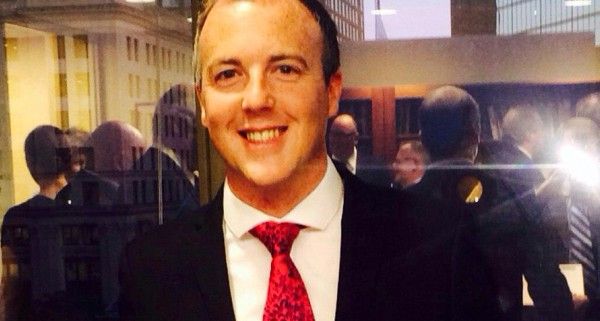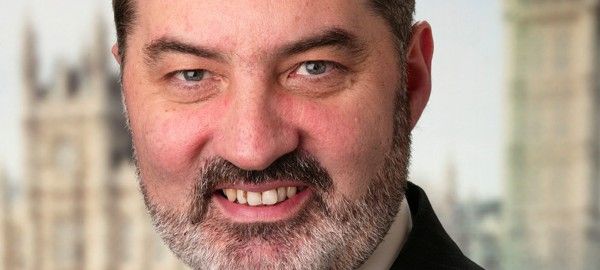Conor Houston to lead the EU Debate NI as Programme Director
Conor Houston is joining the Centre for Democracy and Peace Building team as Programme Director for the “EU Debate NI”.
Conor is a lawyer, influencer, strategist, collaborator, innovator and active citizen.
He is a graduate of the School of Law at Queen’s University Belfast and obtained his masters in International Human Rights law before studying at the prestigious European Public Law Group Academy in Greece.
In his time as a lawyer he represented clients to the Supreme Court of both the UK and ROI and was involved in high profile and pioneering cases. He also represented his profession internationally and was the first lawyer from NI to serve on the Executive Board of the European Young Bar Association, which included speaking at a forum for young lawyers at the European Parliament and representing over 36 organisations across Europe. Conor was the youngest solicitor to be elected to serve on the Council of the Law Society of Northern Ireland.
Conor is a Fellow of the U.S. State Department Rule of Law programme and was UK National Leader in 2015 of Team UK at the Ship for World Young Leaders programme – an international leadership and cross-cultural exchange hosted by the Cabinet Office of the Government of Japan. The Vice-Chancellor of Ulster University hosted a honorary guest lecture delivered by Conor in recognition of this achievement.
Conor is passionate about youth empowerment and has been involved in the establishment of groups and programmes to promote new models of leadership including Young Leaders NI and Young Influencers. He has spoken at a number of conferences and events, including the British Irish Association and was Event Manager at TEDxWomen hosted by CDPB at Stormont Castle in May 2015.
CDPB welcomes three exceptional WIP Class of 2015 students
We are delighted that 3 exceptional WIP Class of 2015 students: Lucy Jones, India Fahy and Gary Cooke are joining the CDPB for the Community Service and Advocacy phase of the programme.
For the past 20 years, WIP has supported the peace and reconciliation efforts in Northern Ireland and Ireland.
Identifying young people with a commitment to service and a track record of leadership, we build their skills through work experience, educational opportunity, and hands-on citizenship both at home and in the US.
Through these efforts, WIP is building the next generation of leaders that will achieve a peaceful, stable and prosperous future for Northern Ireland and Ireland.
LUCY JONES | UNIVERSITY COLLEGE CORK | LAW
Lucy is a final year law student at University College Cork, with a passion for International Law. In 2014 Lucy founded “Know Offence”, a campaign which aspires to help students affected by sexual violence. She previously interned for the Office of the Prosecutor at the International Criminal Tribunal for the former Yugoslavia and the Philadelphia District Attorney’s Office. She is passionate about access to justice and has volunteered for the American Red Cross providing legal advice for urban disaster survivors. She also travelled to Mexico City to volunteer for the refugee community centre Casa Refugiados. Lucy loves to debate. She served on the committee of the Philosophical Society and has represented her society internationally. She is currently an oralist on Ireland’s Philip C. Jessup International Law Moot Court team.
INDIA FAHY | LONDON SCHOOL OF ECONOMICS | LAW
India is a second year Law student at the London School of Economics. She is a founding member of the newly formed Integrated Education Alumni Association, aimed at promoting the importance of integrated education to the Northern Ireland peace process. She is focused on empowering young people to shape the future of Northern Ireland, having written a column entitled ‘Class Re-Act’. This culminated in her receiving an Outstanding Contribution to Public Service Award. India remains interested in regenerating Northern Ireland and has helped to organize a number of events on the subject. India also has an avid interest in human rights, having served on both the Youth Advisory Panel and Active Members Sub Committee of Amnesty International UK.
GARY COOKE | UNIVERSITY COLLEGE DUBLIN | MECHANICAL ENGINEERING WITH BUSINESS
Gary is a master’s student studying Mechanical Engineering with Business. He is currently a member of the Board of Directors for EIL Intercultural Learning and the treasurer for the Mechanical Engineering Society. Gary is a former committee member of the Literary and Historical Society, Europe’s largest student society. He contributed to the society in two different roles: Public Relations Officer for the 159th session and Schools Competitions Officer for the 157th session, for which he received the gold medal for “Outstanding Contribution to the Society”. Gary spent his third year of his undergraduate degree studying abroad in University of California, San Diego. He became actively involved in the UCSD community in his role as “Programs and Marketing Intern” within the International House, with responsibility for a number of community development programs and events.
Lord Alderdice response to the Statement by the Secretary of State for Northern Ireland on the developing crisis in the power-sharing institutions at Stormont
Responding in the House of Lords today to the Statement by the Secretary of State for Northern Ireland on the developing crisis in the power-sharing institutions at Stormont
Lord Alderdice (LD):
My Lords, for a number of years when I was on the IMC I focused a great deal on the monitoring of paramilitary organisations. Is the Minister aware that the balance and order of things in this Statement could potentially be misleading? It focuses heavily on the question of whether t…here has been IRA activity, as though that was the real primary cause of the current crisis, when in truth this crisis has been developing for months and months over the failure of the political parties—particularly the two leading political parties—to work together in a proper governmental way. This recent event is important, but it should not be allowed to distract us from the fact that if it were magicked away tomorrow morning, the problems would remain.
Secondly, is the Minister aware that even if welfare reform were taken back to Westminster—and if it has to be so, I certainly would not oppose it—that would still leave a complete breakdown in the relationship between the Democratic Unionist Party leadership and the Sinn Fein leadership? Without a working relationship together, the devolved structures will not be able to continue, whether or not they have a problem of welfare and whether or not there is any indication of IRA activity. One must say that Sinn Fein has said the kind of things that many people wanted it to say for years on the IRA: that this was criminal activity; that people should go to the police with information; and that there was absolutely no justification. The Statement refers to “politically motivated violence”, but I have the sense that everything we know about this incident means that it was personally motivated violence rather than for the purpose of destabilising Northern Ireland.
Therefore, will the Minister take back to his colleagues who are engaged in this process that we do not need another monitoring commission or another short-term political fix but a change in the kind of relationships there are between the senior leaderships of the DUP and Sinn Fein? If not, we will be faced, as the noble Lord, Lord McAvoy, has suggested, with legislation in this place to take back powers, which would be a disaster.
Healing Memories. Healing Mind | 18 Sept | Ulster Museum | #CNB15
Centre for Democracy and Peace Building in partnership with the Ulster Museum
invite you to
Healing Memories / Healing Mind
Eugen Koh – a psychiatrist and psychoanalytic psychotherapist from Melbourne, Australia will present his recent work with traumatised Aboriginal communities in the Central Desert of Australia.
Followed by panel discussion with Lord Alderdice, Colin Davidson and Kim Mawhinney.
Friday, 18 September 2015 from 2pm to 4pm
Ulster Museum, Botanic Gardens, Belfast BT9 5AB
Please RSVP no later than Wednesday, 16 September
to rsvp@democracyandpeace.org
Part of Culture Night Belfast 2015 Programme www.culturenightbelfast.com
Workshop with Nick Pickles, UK Policy Lead at Twitter | 15 Sept | NICVA
Twitter workshop at NICVA in collaboration with the Centre for Democracy and Peace Building.
Tuesday, 15 September from 3pm – 4.30pm
Learn from the Twitter’s UK Policy Lead Nick Pickles on the best practices of campaigning on the platform, covering a range of creative ideas and inspirations as well as simple tips and planning tools that will help you reach more people with your messages.
The session will last roughly 90 minutes and will include a Q&A session afterwards.
As numbers are limited, this event is strictly for Voluntary and Community sector organisations with an interest in maximising their use of Twitter.
Register: http://www.nicva.org/node/3011/register
Lord Alderdice to speak at RISING – a new global peace forum
RISING, a new global peace forum in Coventry, UK, is launched on Monday 17 August, with a specially filmed message to the world from Archbishop Desmond Tutu. Speakers confirmed for the first annual event include Rt Hon Gordon Brown, Terry Waite CBE, and Cardinal Onaiyekan, Roman Catholic Cardinal Archbishop of Abuja, Nigeria.
With the theme ‘A Hard Road to Hope’, the inaugural RISING 15 will see global statesmen, business leaders, peace advocates and members of the public meet in the city from 11 – 13 November 2015. Together they will push forward new ways of thinking about peace and conflict in our turbulent world. Tickets go on sale shortly and it expected that up to 400 people from around the world will attend.
RISING is a partnership between Coventry City Council, Coventry University and Coventry Cathedral. Coinciding with Armistice Day and the 75th anniversary of the bombing of Coventry on 14 November 1940, it will take place in buildings surrounding the shattered ruins of the city’s medieval cathedral. Preserved as a reminder of the trauma caused by World War Two, this iconic landmark has become a potent symbol for peace and reconciliation around the world.
Speakers at RISING 15 will include:
- Rt Hon Gordon Brown, former Prime Minister and UN special envoy for Global Education.
- Lord John Alderdice, former Speaker of the Northern Ireland Assembly and leader of the Alliance Party of Northern Ireland, now a Liberal Democrat in the House of Lords where he chairs Parliament’s All Party Group on Conflict Issues.
- Terry Waite CBE, humanitarian, author and former aide of the Archbishop of Canterbury, who was kidnapped and held hostage in Lebanon for 1,763 days.
- Archbishop Josiah Idowu-Fearon, Secretary General of the Anglican Communion, one of the world’s biggest Christian denominations with 85 million members in over 165 countries.
- Cardinal Onaiyekan, Roman Catholic Cardinal Archbishop of Abuja, Nigeria.
- Michael Binyon OBE, Veteran foreign correspondent and leader writer for The Times.
- Mary Harper, the BBC World Service’s Africa Editor.
- Sam Lee, Director of Send in the Clowns, a documentary film exploring the impact of prolonged aid in Haiti as it follows a group of idealistic volunteer performers from Clowns without Borders.
- Iman Icar, Deputy Mayor of Mogadishu, capital of Somalia and one of the world’s most divided and volatile cities.
- Emma Sky OBE, who served in Iraq longer than any other senior military or diplomatic figure, first as the Coalition’s Governorate Coordinator for Kirkuk province and later as an adviser to the US Commanding General.
- Richard Smith, a peacebuilder and anti-apartheid activist working with one of Africa’s leading peacebuilding organisations, the Action Support Centre.
- Karam Hilly, an activist and community organiser from Syria working for peaceful demonstration and change. Karam was detained by the Assad regime in 2014 and fled to Turkey. He still works in Syria to keep hope alive, but at great personal risk.
- Colonel Dr Brendan O’Shea, a Commandant in the Irish Defence Forces who has worked on international peace support operations in the Middle East, the Balkans and West Africa.
For more information please visit www.rising.org






